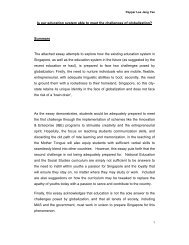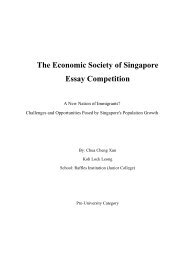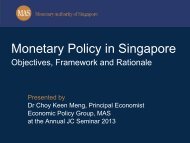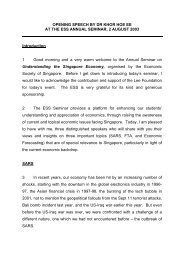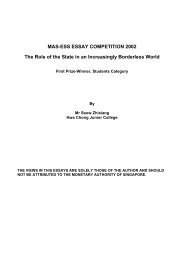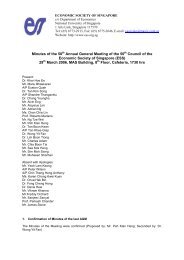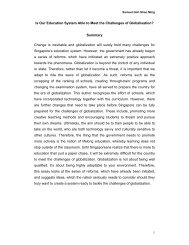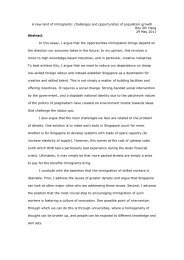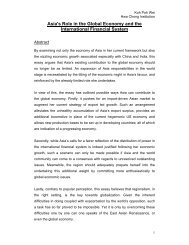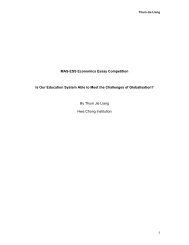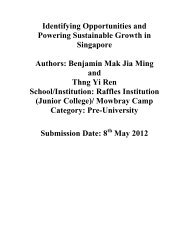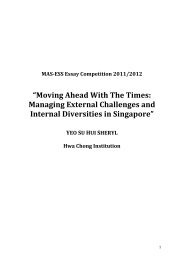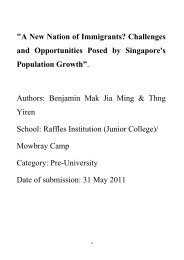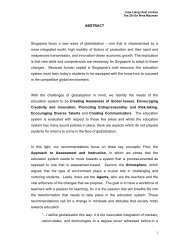the role of the state in an increasingly borderless world - Economic ...
the role of the state in an increasingly borderless world - Economic ...
the role of the state in an increasingly borderless world - Economic ...
- No tags were found...
Create successful ePaper yourself
Turn your PDF publications into a flip-book with our unique Google optimized e-Paper software.
components <strong>in</strong>to remuneration packages <strong>an</strong>d cutt<strong>in</strong>g back on seniority-based pay. We cut<br />
direct taxes sharply (from 40% to 33%), <strong>an</strong>d laid <strong>the</strong> ground for <strong>in</strong>troduc<strong>in</strong>g <strong>the</strong> GST a few years<br />
later. Competitiveness <strong>an</strong>d flexibility became import<strong>an</strong>t yardsticks for economic policy <strong>an</strong>d<br />
collective barga<strong>in</strong><strong>in</strong>g.<br />
In our overall development strategy, we put more emphasis on <strong>the</strong> services sector as a<br />
major growth eng<strong>in</strong>e, alongside m<strong>an</strong>ufactur<strong>in</strong>g that had long been a key driver. In<br />
m<strong>an</strong>ufactur<strong>in</strong>g, we made a conscious effort to assimilate <strong>an</strong>d adopt new technology from <strong>the</strong><br />
adv<strong>an</strong>ced economies, mov<strong>in</strong>g up <strong>the</strong> value cha<strong>in</strong> as our <strong>in</strong>comes <strong>an</strong>d capabilities rose.<br />
These policy ch<strong>an</strong>ges worked better th<strong>an</strong> we had hoped for, aided by favourable<br />
external conditions. East Asia was undergo<strong>in</strong>g <strong>an</strong> economic boom, <strong>the</strong> global electronics<br />
<strong>in</strong>dustry was exp<strong>an</strong>d<strong>in</strong>g rapidly, <strong>an</strong>d <strong>the</strong> US economy was experienc<strong>in</strong>g its longest post-war<br />
recovery. For a decade until <strong>the</strong> Asi<strong>an</strong> f<strong>in</strong><strong>an</strong>cial crisis broke <strong>in</strong> 1997, growth averaged 9.2% a<br />
year. By 1994, per capita <strong>in</strong>come had doubled to US$20,000, well <strong>in</strong> <strong>the</strong> league <strong>of</strong> developed<br />
countries. With<strong>in</strong> a generation, <strong>the</strong> lives <strong>of</strong> S<strong>in</strong>gapore<strong>an</strong>s have been tr<strong>an</strong>sformed beyond<br />
recognition.<br />
Towards a Knowledge-based Economy<br />
We always knew that as our economy matured, <strong>an</strong>d we approached <strong>in</strong>come levels <strong>of</strong> <strong>the</strong><br />
developed <strong>world</strong>, our growth would slow down. But we did not expect <strong>the</strong> tr<strong>an</strong>sition to be so<br />
sudden <strong>an</strong>d difficult. The Asi<strong>an</strong> Crisis was a major setback for <strong>the</strong> whole region. Before <strong>the</strong><br />
region could fully recover, <strong>the</strong> US economy went <strong>in</strong>to recession. In Asia, Ch<strong>in</strong>a cont<strong>in</strong>ues to<br />
prosper, which is both a major opportunity <strong>an</strong>d a huge competitive challenge. On top <strong>of</strong> that,<br />
September 11th <strong>an</strong>d <strong>the</strong> discovery <strong>of</strong> terrorist groups <strong>in</strong> Sou<strong>the</strong>ast Asia l<strong>in</strong>ked to Al-Qaeda,<br />
signalled a new <strong>an</strong>d troubl<strong>in</strong>g long-term problem. In <strong>the</strong>se troubled circumst<strong>an</strong>ces, we entered<br />
<strong>the</strong> third phase <strong>of</strong> our economic development.<br />
We needed to reth<strong>in</strong>k all our economic policies <strong>an</strong>d strategies. The <strong>Economic</strong> Review<br />
Committee (ERC) report sets out what policies we need to ch<strong>an</strong>ge, <strong>an</strong>d what new strategies to<br />
pursue. The ERC made m<strong>an</strong>y specific recommendations to prepare S<strong>in</strong>gapore for <strong>the</strong> tr<strong>an</strong>sition<br />
to a knowledge-based economy. But underly<strong>in</strong>g <strong>the</strong>m all are three fundamental, related ideas:<br />
Firstly, we must promote <strong>in</strong>novation, creativity, <strong>an</strong>d entrepreneurship.<br />
Secondly, we must deregulate <strong>an</strong>d liberalise <strong>the</strong> economy, to allow enterprise to flourish.<br />
And thirdly, we must encourage self-reli<strong>an</strong>ce complemented by community support, <strong>an</strong>d<br />
m<strong>in</strong>imise dependence on <strong>the</strong> <strong>state</strong>.<br />
These ideas emphasise that private enterprise must <strong>in</strong>creas<strong>in</strong>gly lead growth, <strong>an</strong>d that to<br />
cont<strong>in</strong>ue to thrive, we must be will<strong>in</strong>g to venture <strong>in</strong>to <strong>the</strong> unknown, explore new ideas, <strong>an</strong>d<br />
establish new enterprises. To succeed, <strong>the</strong> <strong>in</strong>itiative must come from <strong>in</strong>dividuals ra<strong>the</strong>r th<strong>an</strong> <strong>the</strong><br />
<strong>state</strong>. The government’s <strong>role</strong> is to facilitate <strong>the</strong> creation <strong>of</strong> wealth <strong>an</strong>d to enable <strong>in</strong>dividuals to<br />
do well. It is not to provide h<strong>an</strong>douts or excessive social safety nets.<br />
M<strong>an</strong>y S<strong>in</strong>gapore<strong>an</strong>s, particularly <strong>the</strong> workers, feel <strong>in</strong>st<strong>in</strong>ctively that <strong>the</strong> ERC ch<strong>an</strong>ges are<br />
far-reach<strong>in</strong>g, <strong>an</strong>d worry that we are mov<strong>in</strong>g too fast. On <strong>the</strong> o<strong>the</strong>r h<strong>an</strong>d, some <strong>an</strong>alysts <strong>an</strong>d<br />
journalists have faulted <strong>the</strong> ERC recommendations for not be<strong>in</strong>g bold enough. I hope that<br />
sett<strong>in</strong>g <strong>the</strong> ch<strong>an</strong>ges with<strong>in</strong> this larger philosophical context will help to br<strong>in</strong>g out <strong>the</strong>ir true<br />
signific<strong>an</strong>ce. Much more so th<strong>an</strong> <strong>the</strong> two previous paradigm shifts <strong>of</strong> <strong>the</strong> 1960s <strong>an</strong>d 1985, <strong>the</strong><br />
current one calls for a m<strong>in</strong>dset ch<strong>an</strong>ge – on <strong>the</strong> part <strong>of</strong> everyone. That is <strong>the</strong> fundamental<br />
remak<strong>in</strong>g that we are striv<strong>in</strong>g for.<br />
9



